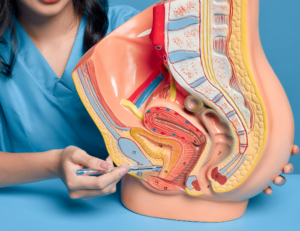Wondering what it will be like when your waters break is common. At WomanCare in Illinois, we’re here to provide exceptional healthcare throughout your pregnancy journey. One of the ways we do that is through education. Here are some questions about waters breaking we hear and their answers:
Q: What are the waters?
A: Your baby develops inside a bag of fluid called the amniotic sac. When your waters break, the sac breaks and the fluid comes out through your vagina. This can occur before contractions begin, during labor, or through artificial rupture of membranes (ARM) when your midwife or obstetrician breaks your waters to induce or speed your labor.
Q: How are waters broken artificially?
A: Your doctor will make a small break in the membranes using a long thin probe (amnihook) or a medical glove with a pricked end (amnicot). It will feel similar to an internal examination.
Q: Why would my doctor break my waters?
A: If your labor is going very slowly, your doctor may recommend breaking your waters. This can help shorten labor and doesn’t hurt the baby. However, having your waters artificially broken may make your contractions more painful so you may want to talk to your doctor about pain relief beforehand.
Q: Will it hurt?
A: When your waters break, it’s not painful although it may occur at the same time as a painful contraction. Following your water breaking, your contractions may speed up and grow in intensity.
Q: What does it feel like when my waters break?
A: Your waters breaking may feel like a mild popping sensation, followed by a gush or a trickle of fluid. You may not even notice your waters have broken or you may notice an unusual amount of dampness in your underwear that doesn’t smell like urine.
Q: What do I do when my waters break?
A: You can put a sanitary pad in your pants. Once your waters break, the baby is at risk of infection and your doctor or midwife may ask you to come to the hospital to be checked, even if you aren’t in active labor yet. You need to go to the hospital immediately if you are less than 37 weeks pregnant because you may be at risk of premature labor. Other signs you need to go to the hospital right away are: if you develop a high temperature if your waters aren’t clean or have an unusual smell, there’s a lack of movement from the baby, you’re losing blood, or you know you have Group B strep.
Q: What happens if my water breaks before I go into labor?
A: Your waters may break before you go into labor. It’s likely you’ll go into labor on your own within 24 hours of your water breaking. If labor doesn’t start naturally, your healthcare provider may offer to induce labor.
Our team at WomanCare is always here to help answer any questions and concerns you may have. It’s common to feel anxious about the labor and delivery process but, knowledge is the best tool for confidence. Call us at (847) 221-4400 to schedule your appointment in Arlington Heights, Buffalo Grove, Kildeer, and more.








